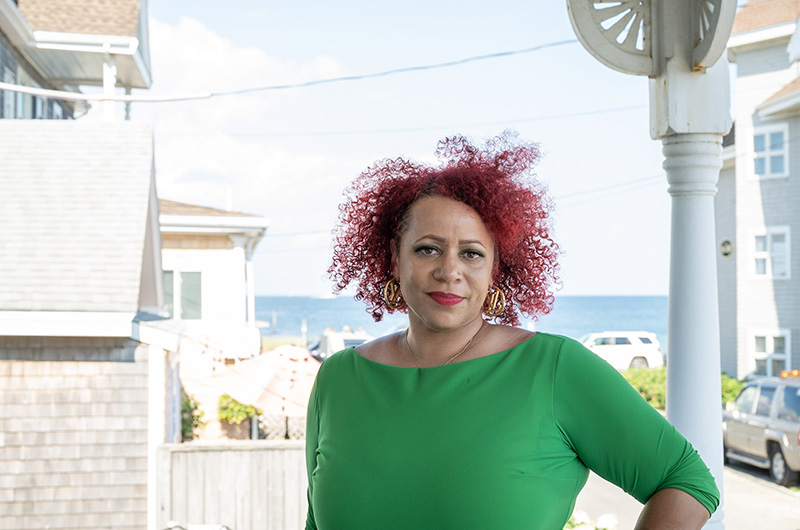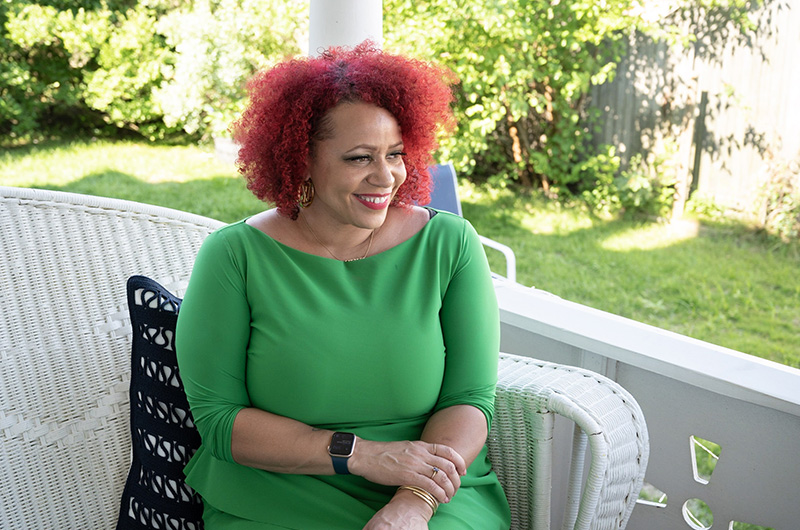For Nikole Hannah-Jones, it’s not about her own achievement anymore.
Within about five minutes of arriving at the Dunmere hotel in Oak Bluffs, she stood on the wraparound porch, looked out toward Inkwell Beach and took in a deep breath of ocean air.
“I think I need to extend my stay,” she said to Kahina Van Dyke, the Dunmere’s owner who hosted the renowned investigative journalist on the Vineyard last week.
Growing up, Ms. Hannah-Jones, whose grandmother was a sharecropper born on a cotton plantation, had no idea that places of leisure existed for black people. She began hearing about black people vacationing on Martha’s Vineyard when she moved to New York, but even then, in her mind she pictured a haven for sophisticated elites, out of reach for a girl from the working class like her. Now a work trip had brought her to the Island for the first time, and she was the first guest at the Dunmere since its reopening. “I needed it at this point in my life, I’ll say that,” said Ms. Hannah-Jones, who gave a talk at the Union Chapel speaker series a day earlier.
Ms. Hannah-Jones has had the kind of summer that might leave a person longing for a beach and ocean air. After the University of North Carolina at Chapel Hill denied her tenure, and then following backlash extended her the offer, she decided to instead accept a tenured position as the inaugural Knight Chair in Race and Journalism at Howard University. But finding herself in the headlines is not new for Ms. Hannah-Jones. Her 1619 Project, which reframes the legacy of slavery as foundational to America’s national narrative, has drawn criticism from some historians and conservative groups.
“I really am on Fox News every three days, whether I say anything, publish anything or not. And it’s very strange and it’s taxing, very taxing,” she said. She did not want the UNC story to blow up, she said. “I was just going to accept what happened because I did not want to be the story again. And then it became a story anyway. It’s not what I wanted, but I also accept this is my life right now, so I try to use the platform for the larger benefit of my community.”
It is why she’s heading to Howard, a historically black university, and not just with a secured tenured position for herself but also with $20 million in donations for the larger institution. There, she’s launching the Center for Journalism and Democracy to train reporters to hold powerful institutions accountable and catalog the ways democracy fails. She is also working on founding another program for kids in her hometown of Waterloo, Iowa, although she can’t discuss the initiative in detail quite yet. Giving a leg up to journalists of color is also why she co-founded the Ida B. Wells Society for Investigative Reporters. Her larger work at the New York Times, she said, is all about helping black Americans “get some sense of equity and justice.” She also has a book on school segregation in the works.
It’s an overwhelming load of projects to juggle, she admits.
At 45, Ms. Hannah-Jones is by no means done accomplishing things, but with nearly every major award for journalists and writers under her belt — a Pulitzer, a MacArthur Genius Grant, a Peabody, a Polk, among others — she no longer thinks of her career in terms of personal advancement. And that, she admits, has been liberating. “I’ve spent so much of my life being motivated by people’s low expectations of me and I don’t care anymore,” she said. She’s driven by other things now. “I see my life as repaying a debt back to my ancestors. I have to do everything I can with what I’ve been given, because I know all that they could not do.”
Ms. Hannah-Jones thinks a lot about the link between the collective and individual choices of the past and where we are today. Growing up, she mined history books to make sense of the disparities she observed around her: she wondered why communities where black people lived were always the poorest and least kept up, and despite working hard, the people were blamed for it. “History kind of explained the architecture of what I was seeing, but that wasn’t discussed,” she said.

She reads history obsessively, usually multiple books at once. There are stacks of books everywhere in her New York home, she says. She’s now in the middle of How the South Won the Civil War by historian Heather Cox Richardson. Understanding history calms her, she said. But it also troubles her. “You can see more clearly where our country is heading right now, which is also very frightening,” she said. The ongoing legislation against critical race theory and the 1619 Project in classrooms are dangerous, she explains, because they seek to prevent the legacy of black people from seeping into the collective memory. “And it is that collective grappling that leads to policy change, and it is the erasure of those narratives that leads to policies that maintain inequality. And that’s really what we’re dealing with,” she said.
At Howard, she’ll teach students to cover racial inequality by tracking data and do archival research, a skill Ms. Hannah-Jones believes elevates journalism work to a higher level. She recalled coming across handwritten notes in the margins by a judge of a landmark Supreme Court desegregation case in Detroit. Getting a glimpse into what the judge was thinking while considering the case was insightful. “You can interview a historian — that’s a process of discovery, but to be able to do some of that research on your own, makes your journalism more powerful,” she said.
She also will bring in readings from sociology, economics and political science. “It’s going to really help us have a better understanding of the country in which we live so that we can better cover the country in which we live,” she said.
Ms. Hannah-Jones is a believer in the objectivity of method — is the reporting fair? Is it accurate? — as opposed to being guided by neutrality, which in fact can be harmful for journalists, she said. “By me knowing and admitting what my biases are, I report into them,” she said. “So I think it’s important to me to stop pretending that neutrality is the goal, but actually that working on behalf of vulnerable people, holding power accountable, truth-telling is the goal.”
On Friday afternoon, Ms. Hannah-Jones lingered in the garden of the Dunmere with a group of women, after an earlier brunch that Kahina Van Dyke had hosted for people to meet her. In the shade, beneath a sprawling red umbrella, the women talked, drank wine and took selfies with Ms. Hannah-Jones.
“We wanted to let her know that as a community we are here for her,” said Ms. Van Dyke. “Nikole is talking about the things that many people don’t want to talk about, but we all need to be talking about — all of us.”





Comments
Comment policy »